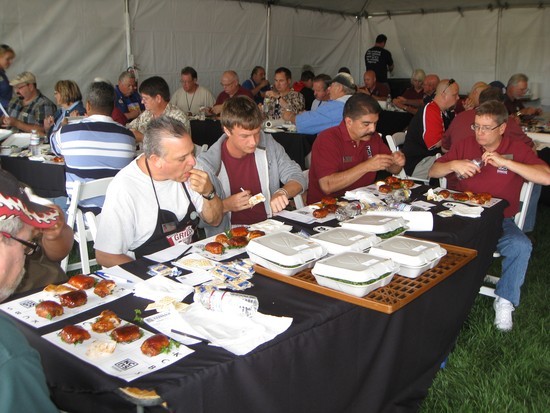
The last time we talked BBQ for the New Year's Eve contest at Knott's Splash Mountain, I promised you an inside view of the judges' tent of a sanctioned barbecue contest. This week: a video and a discussion of how competition barbecue is scored, plus information on where you can become a certified barbecue judge in Southern California next month!
]
Barbecue contests in the United States are sanctioned by several organizations such as the Kansas City Barbecue Society, the Memphis Barbecue Network, the International Barbecue Cookers Association, and a few others which each have their own rules and regulations. The biggest of the sanctioning bodies is KCBS, whose rules are used at contests all over the country and even overseas. IBCA is strongest in its Texas home, although we do have contests in California that follow their rules. MBN is most popular in the South, but has never sanctioned a contest in California to my knowledge.
While all of the sanctioning bodies require that the heat source used to smoke meat must be wood or charcoal, each one has different rules on what meats must be cooked, how teams present those meats to judges, and how judges score them. For example, only MBN has a category for whole hog and whole pork shoulder. Today's video will show a KCBS-sanctioned contest I attended in December.
KCBS has four meat categories: chicken, pork ribs, pork shoulder, and beef brisket, which each present different challenges to the cook. Each meat must be presented in a standard 9″ x 9″ styrofoam take-out box that contains at least six portions, because a group of six judges will be scoring it. Teams aim to cook each meat perfectly moist in that narrow window between underdone and overcooked, and flavor the meat in a way that all six judges will find it excellent. The judges' job is to score those meats for its appearance to the eye, the combined taste sensations of meat, smoke, seasoning and the optional sauce, and finally, assess how well-cooked the meat is. That's the super-boiled down point of the contest game, but anyone interested in judging or cooking should read the KCBS rules
Appearance is assessed in a few seconds, on a quick first impression: does the presentation make you want to dive right in, or is the meat unappealing to the eye? On to taste: if the flavor sensations excite and please you, give it a good score. Of course, if your expectation of good barbecue is the teriyaki-chipotle-honey glaze you grew up on, then your scores might be different from the other five people at your table that expect to taste middle-of-the road American barbecue. The goal for cooks is to make the best “average” barbecue they can: aim for the middle of the bell curve of what six random judges will find delicious.
[
Texture is probably the hardest criterion to judge, especially if you've never cooked barbecue yourself and haven't experienced first-hand how the meat changes texture through the cooking process. For instance, when brisket is cooked, it stays a bundle of very tough, rope-like muscle fibers, and undercooked entries will be rubbery. When brisket approaches perfection, the collagen and fat in the meat liquefy, and each bundle of muscle fiber loosens from its neighbor. When sliced, each piece will be perfectly tender and juicy, and pull apart between your hands with a gentle, slightly elastic snap. Once overcooked, brisket gets mushy and those muscle fibers crumble apart as the connective tissue dissolves completely. For judges, that knowledge can also come after judging a few high-quality contests attended by a roster of good cook teams.
Now for the part you've been waiting for: there is only one judging class scheduled in Southern California for 2012 thus far, and it happens in downtown San Diego on Saturday February 25. The National Barbecue Association, a trade group for restaurants and caterers holds their annual convention there this year, and will have two separate judging classes for both KCBS and MBN. MBN has never held a judging class in California before, and this event is the only way to become certified for both organizations in one day.
Register online at NBBQA.org. More details on pages 13 – 15of their conference flyer.
Memphis Barbecue Network Judging Class
$50 for NBBQA members, $90 for non-members
Saturday February 25, 2012. 7:30 am to 12:30 pm
Kansas City Barbecue Society Judging Class
$90 for both NBBQA members and non-members
Saturday February 25, 2012. 12:30 pm to 4:30 pm
Follow Stick a Fork In It on Twitter @ocweeklyfood or on Facebook!

